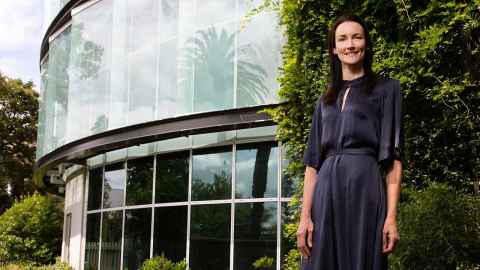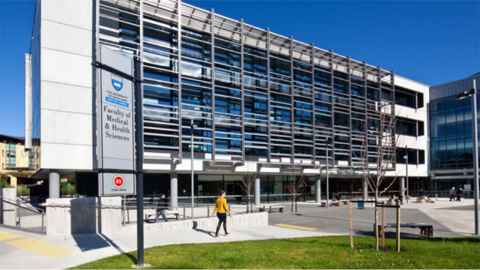The heart and soul of brain research
20 April 2022
“I love my job. I really do,” says Dr Emma Scotter, Head of the Motor Neuron Disease Laboratory in the Centre for Brain Research at the University of Auckland.

This is for reasons we can all relate to. It gives meaning to her life and offers a gleam of hope to those she is working with her whole heart to help.
However, she admits to another powerful force that has often kept her up late into the night. This is the intellectual challenge posed by a disease with a highly complex chain of causes, which requires input from multiple sources to advance the understanding that is urgently needed.
These include scientists and clinicians from our University and from around the world; people living with motor neuron disease (MND), who form an essential part of the research team; staff and volunteers from the Motor Neuron Disease Association of New Zealand (MND NZ), which is both a sponsor and close collaborator; and generous donors vital for sustaining the scope and quality of the work.
Motor neuron disease, as the name implies, attacks the cells in the brain which govern movement. For the 90 to 95 percent of sufferers who have no prior warning, it announces its arrival in small but insistent ways, perhaps in the form of an unexpected weakness or a fumble with a button that you’re trying to do up. From those deceptively mild beginnings the disease advances inexorably, leading to progressive loss of motor function and to loss of life, usually within three to four years of diagnosis.
For the people who develop the disease and for those who love them the diagnosis is devastating, and for most it comes with no prior knowledge of family history or genetic predisposition.
For those who research the disease, says Emma, “it catches you by the heart”.

Emma trained as a cell biologist at the University of Auckland, where she conducted research on Huntington’s disease at the Centre for Brain Research. In 2010 she was awarded an international fellowship to fellowship to King’s College London, where she began working with an interdisciplinary team on the genetics of MND.
By the time she returned home four years later, having been awarded an Aotearoa Fellowship from the Centre for Brain Research, she had established strong international connections, laying the path for fruitful collaborations. She also came back with a lively awareness of the need to investigate MND in New Zealand in a way that would help those living here while also advancing global knowledge.
MND is not like Huntington’s disease, Emma explains. There is no one causative gene shared by those with a family history. Instead it can be linked with many genes – at least 35 – and probably with more that are not yet discovered.
A number of factors are likely to be required to trigger MND. These could include genetic errors, perhaps more than one, plus an assault from one or more chemicals found in the environment. There is even the possibility that cases could arise with no genetic component at all.
But one thing Emma has no doubt of – “Knowledge is power”. And already the team she leads at the University of Auckland has added new knowledge to the global pool which provides the most powerful resource for researchers.
Importantly, the team has established that New Zealand has one of the highest incidences of MND in the world – which paves the way for research on “clusters” in particular areas and on possible environmental explanations.
It has also laid the base for a large current study, led by Emma and Associate Professor Richard Roxburgh, on the genetics of MND in New Zealand – made possible by generous philanthropic support from the late Marcus Gerbich and Dr Amelia Pais-Rodriguez, MND NZ, Freemasons NZ, and others. The team is seeking to learn if the high rates of disease are because of high numbers of people with particular genetic mutations – or because of other factors.
Different research methods are providing blocks of knowledge that can then reinforce and amplify one another.
One is to take a punch biopsy from the arms of patients. Since (almost) every cell in the body contains the same DNA, this provides a microcosm of what is happening in the brain: a way of getting in there and examining changes during the progress of the disease. It also allows cultivation of new live cells, enabling study of the biological impacts of genetic errors using living tissue.
Also vital are the brains bequeathed to the Neurological Foundation Human Brain Bank by people who have died from MND, leaving behind this priceless gift to benefit their families – and others – even down through the generations. In the case of one person involved, says Emma, “We were able to learn from his brain how to interpret the blood sample he gave us during his life. Now we are working with his family to achieve the best outcomes for them.”
Family histories are richly informative, for example in allowing genetic comparisons between those who develop MND and those who do not. The genetic knowledge emerging from this study is allowing some of these invaluable links to be drawn between New Zealanders who were unaware of any family history and their distant relatives living elsewhere, for example in Australia or the UK. These are allowing the documentation of “super-families”, with the possibility of tracing the disease to a common ancestor.
Though there is no cure yet for MND, promising treatments are now being trialled which are immensely exciting, says Emma. At least one has been shown to halt the progression of the disease in some individuals.
This gives new hope to her research participants, for whom a new knowledge of their genetic “landscapes” opens chances of their being selected for trials of promising new treatments, which often target particular genes.
Emma has been inspired as well as supported by the late Marcus Gerbich and Dr Amelia
Pais-Rodriguez, who have given substantial support to enable this research
“My husband has motor neuron disease,” said Dr Pais-Rodriguez in late 2021. “We wanted to support research that would have an impact. Emma gives us updates and we’re able to keep up with progress and to feel we are part of a very worthwhile project. I and my husband really feel that this research has progressed knowledge.”
Said Emma, “This is work we share. We’re doing it together.”
Sadly, friend and supporter of the Centre for Brain Research Marcus Gerbich died in February 2022.
Says researcher Dr Emma Scotter: “Marcus was tireless in his efforts to change the face of MND research; writing a pseudonymous book about his experience, contributing to research quantifying the cost of motor neuron disease, and acting as the major sponsor of our national MND genetics study.
“He was also an absolutely lovely man, taken far too soon by this dreadful disease.”
Marcus is survived by his wife, Dr Amelia Pais-Rodriguez, and sons Marcus, Hugo and Diego Gerbich-Pais.
Media contact
Helen Borne | Communications Manager
Alumni Relations and Development
Email: h.borne@auckland.ac.nz